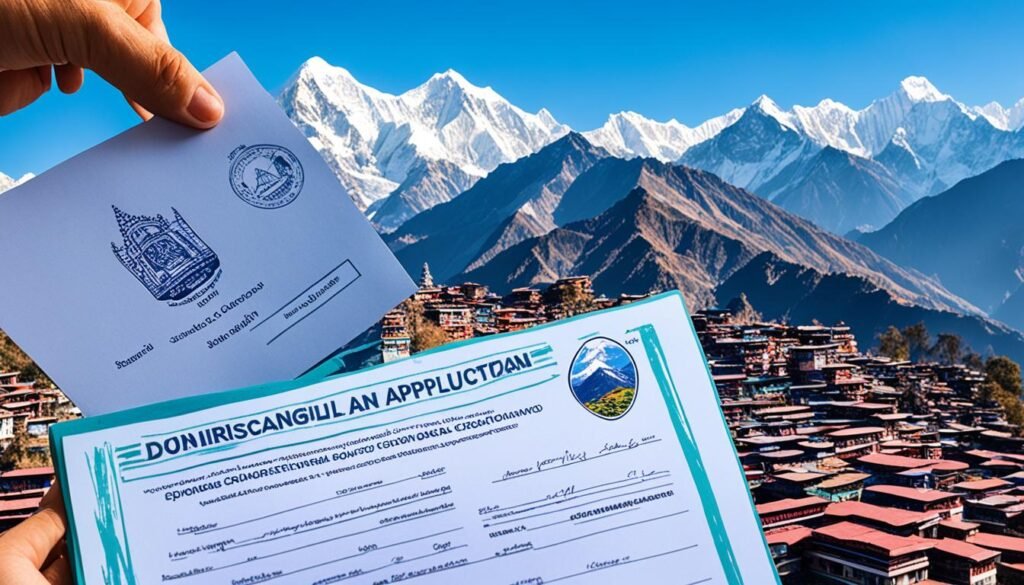Did you know that the Himalayan region, which spans across several countries, is home to over 52,000 species of plants and animals? This vast and diverse ecosystem, nestled between towering peaks and ancient glaciers, offers an unparalleled opportunity for in-depth exploration and study. In the heart of this captivating region lies Nepal, a country that has become a hub for Himalayan Studies, attracting students from around the world who seek to deepen their understanding of this remarkable part of the world.
The Himalayan Studies Master’s program in Kathmandu, Nepal, is a comprehensive and immersive academic experience that delves into the intricacies of the Himalayan environment, culture, and sustainable development. Offered by institutions such as Tribhuvan University, this program equips students with the knowledge and skills to navigate the complex interplay of natural, cultural, and socio-economic factors that shape the Himalayan region.
Key Takeaways
- Comprehensive master’s program in Himalayan Studies offered in Kathmandu, Nepal
- Explore the diverse Himalayan environment, culture, and sustainable development
- Gain in-depth understanding of the region’s geography, ecology, and the relationship between people and the natural world
- Opportunity to engage in field studies and expeditions to enhance practical knowledge
- Prepare for academic, research, and non-profit careers related to the Himalayan region
Introduction to Himalayan Studies in Nepal
Nestled at the heart of the captivating Himalayan region, Nepal offers an unparalleled opportunity to delve into the fascinating world of Himalayan studies. This diverse and awe-inspiring landscape, stretching from Pakistan to Myanmar, is a global treasure trove of natural wonders, rich cultural heritage, and strategic geopolitical significance.
Overview of Himalayan Region and its Significance
The Himalayan region is home to some of the world’s highest mountain peaks, including the iconic Mount Everest. Beyond its breathtaking natural beauty, this area is also renowned for its unique biodiversity and the intricate web of cultures that have thrived in its rugged terrain. Studying the Himalayan region in Nepal provides students with a deep understanding of the region’s ecology, the challenges faced by its communities, and the critical role it plays on the global stage.
Importance of Pursuing Himalayan Studies in Nepal
Nepal’s strategic location at the center of the Himalayas makes it an ideal hub for the study of this remarkable region. By pursuing a master’s degree in Himalayan studies in Nepal, students can immerse themselves in the heart of the Himalayan culture, gain hands-on experience in the field, and contribute to the ongoing research and conservation efforts in this vital area. With its renowned academic institutions and proximity to the Himalayas, Nepal offers unparalleled opportunities for those seeking to deepen their understanding of the Himalayan region’s significance.
Prominent Universities Offering Himalayan Studies
For those interested in deepening their understanding of the Himalayan region, there are several renowned institutions in Nepal that offer exceptional academic programs in Himalayan Studies. Two of the most prominent are Kathmandu University’s Himalaya Centre for Asian Studies (HiCAS) and the Lumbini College of Buddhism and Himalayan Studies.
Kathmandu University’s Himalaya Centre for Asian Studies (HiCAS)
Established in 2019, the Himalaya Centre for Asian Studies (HiCAS) at Kathmandu University is a leading research center dedicated to the study of the Himalayan region. HiCAS aims to evolve as an autonomous and non-profit, world-ranking research hub for Asian Studies, facilitating connections and collaborations between the East and the West. The center offers a range of programs and research opportunities in fields such as Asian languages, cultures, and civilizations, as well as the histories, religions, philosophies, and knowledge systems of the Himalayan countries.
Lumbini College of Buddhism and Himalayan Studies
Another prominent institution offering a master’s degree in Himalayan Studies is the Lumbini College of Buddhism and Himalayan Studies, located in Kathmandu, Nepal. Established in 2013 and affiliated with Lumbini Buddhist University, the college’s two-year, full-time Master’s program in Buddhism and Himalayan Studies emphasizes the study of Buddhist philosophy, history, cultures, languages (Tibetan, Sanskrit, and Pali), heritage architecture, and conservation techniques. The program also offers a broad range of elective courses, including Discourse Analysis, Digital Humanities, and Traditional Himalayan Buddhist medicine.

Nepal: Himalayan Studies Master’s Program Kathmandu Nepal
Aspiring students interested in the Himalayan region can explore comprehensive master’s programs offered in Kathmandu, Nepal. These programs delve deep into the himalayan studies master’s program curriculum nepal, providing a well-rounded understanding of the diverse aspects of this captivating part of the world.
Curriculum and Course Structure
The course structure nepal himalayan studies typically encompasses a wide range of subjects, including Himalayan geography, ecology, and environmental issues. Students also have the opportunity to study the rich subjects offered in himalayan studies nepal, such as Nepali language, Tibetan Buddhist practices, and indigenous knowledge systems. The programs often feature a blend of classroom instruction, field studies, and research projects, allowing students to gain a holistic perspective of the Himalayan region.
Focus Areas and Specializations
Himalayan studies master’s specializations nepal often include areas such as mountain ecology and conservation, sustainable development, Tibetan and Nepali cultures, Buddhist studies, and adventure tourism. Students can delve into focus areas nepal himalayan studies and conduct in-depth research on topics like the impact of climate change on the Himalayan environment, the preservation of indigenous knowledge systems, or the role of religion and spirituality in shaping Himalayan communities.
Admission Requirements and Processes
Aspiring students interested in pursuing a master’s degree in Himalayan Studies in Nepal must meet specific admission requirements to be considered for these competitive programs. The admission requirements for Himalayan studies in Nepal typically involve a combination of academic qualifications, language proficiency, and relevant experience.
Applicants are generally expected to hold a bachelor’s degree in a related field, such as geography, environmental studies, anthropology, or area studies. Proficiency in English, as well as Nepali or other regional languages, may be an advantage. The application process often includes the submission of transcripts, a statement of purpose, and potentially an interview or entrance exam.
Prospective students should carefully review the eligibility criteria for Himalayan studies in Nepal set by their chosen institution to ensure they meet all the necessary requirements. By understanding the admission process and fulfilling the admission requirements for Himalayan studies in Nepal, students can increase their chances of securing a coveted spot in these prestigious master’s programs.
Career Prospects and Opportunities
Graduates of Himalayan Studies master’s programs in Nepal can explore a diverse range of career paths. They may find fulfilling opportunities in academia, research, non-profit organizations, and development agencies focusing on the Himalayan region. The interdisciplinary nature of Himalayan Studies equips students with valuable skills and knowledge that are in high demand.
Academic and Research Careers
Individuals who have completed a Himalayan Studies degree in Nepal can contribute to the growing body of knowledge about this unique and fascinating region. They may secure roles as university professors, researchers, or policy analysts, conducting in-depth studies and sharing their expertise on topics related to the Himalayas. Many graduates also find employment at think tanks, research institutes, or international organizations that specialize in Himalayan-related issues, such as environmental conservation, sustainable development, or cultural preservation.
Non-profit and Development Organizations
The expertise gained through a Himalayan Studies program in Nepal is highly valued by non-profit and development organizations working in the Himalayan region. These organizations often seek individuals with specialized knowledge to contribute to community development, environmental protection, or cultural preservation initiatives. Graduates may take on roles in program management, policy advocacy, project implementation, or community engagement, making a meaningful impact on the lives of Himalayan communities.
Himalayan Cultures and Traditions
The Himalayan region is a captivating tapestry of rich cultural and religious heritage, particularly in the realm of buddhist philosophy nepal. Himalayan Studies programs in Nepal delve into the intriguing world of Tibetan buddhist practices nepal, exploring the diverse traditions and schools that have flourished in this himalayan buddhist culture. Students have the opportunity to learn about the teachings of prominent Buddhist figures, the artistic expressions of this vibrant faith, and the profound role of Buddhist beliefs and rituals in shaping the lives of Himalayan communities.
Indigenous Knowledge Systems
Alongside the study of buddhist philosophy nepal, Himalayan Studies programs in Nepal also emphasize the exploration of indigenous knowledge systems nepal and traditional practices that have evolved within the region. This may include the study of traditional medicinal practices, such as Tibetan or Ayurvedic medicine, as well as the examination of indigenous agricultural techniques, natural resource management strategies, and cultural beliefs that have sustained himalayan traditional practices for generations. By understanding and preserving these valuable knowledge systems, Himalayan Studies programs aim to contribute to the holistic development and well-being of the region.

The exploration of traditional ecological knowledge nepal is a crucial component of Himalayan Studies, as it enables a deeper understanding of the himalayan region’s natural resources and the sustainable practices that have been developed by its indigenous communities over centuries.
Environmental and Sustainability Studies
Nestled within the majestic Himalayan range, Nepal’s universities offer a unique opportunity to delve into the intricacies of mountain ecology and environmental conservation. Himalayan Studies programs in the country place a strong emphasis on understanding the fragile ecosystem of this iconic region, empowering students to contribute to its sustainable development.
Mountain Ecology and Conservation
Coursework and research in these programs often focus on the impact of climate change on Himalayan glaciers and watersheds, the preservation of the region’s rich biodiversity, and the sustainable management of natural resources. Students may engage in field studies, collaborating with local communities to gain insights into traditional knowledge systems and explore innovative eco-tourism initiatives that promote the protection of the Himalayan environment.
The study of himalayan mountain ecology is a crucial component of Himalayan Studies in Nepal, as it equips students with the knowledge and skills to address the complex challenges facing this unique and vulnerable ecosystem. Through interdisciplinary approaches, students explore the interconnected relationships between geology, hydrology, and the diverse flora and fauna that thrive in the Himalayan region.
Alongside the focus on himalayan environmental conservation, Himalayan Studies programs in Nepal also delve into the broader concepts of sustainability. Students may investigate sustainable resource management practices, the role of traditional ecological knowledge, and the development of policies and strategies that balance economic growth with the preservation of the Himalayan environment.
By immersing themselves in the study of nepal mountain ecosystem studies, aspiring researchers and environmental advocates gain a deep understanding of the complex interplay between human activities and the fragile Himalayan landscape. This knowledge equips them to contribute to the formulation of effective conservation measures and the promotion of sustainable development in the region.
Field Studies and Expeditions
Hands-on field experience is a crucial component of Himalayan Studies programs in Nepal. Students may have the opportunity to participate in various himalayan studies field research nepal and himalayan studies expeditions nepal, allowing them to directly engage with the himalayan region field studies and its diverse communities. These immersive activities may include trekking through remote mountain villages, conducting interviews with local residents, and collaborating on research projects related to topics such as ecology, cultural preservation, or sustainable development.
These field experiences not only deepen the students’ understanding of the Himalayan region but also foster valuable skills in data collection, problem-solving, and cross-cultural communication. By actively exploring the himalayan region field studies, students gain a firsthand appreciation for the unique challenges and opportunities that characterize this captivating part of the world.

The field studies and expeditions offered as part of Himalayan Studies programs in Nepal provide an unparalleled opportunity for students to connect with the land, the people, and the profound environmental and cultural significance of the Himalayan region. This hands-on learning experience is a cornerstone of these programs, equipping the next generation of Himalayan scholars and advocates with the knowledge and skills to drive positive change in this dynamic and vital part of the world.
Student Life and Campus Experience
Pursuing a master’s program in Himalayan Studies at universities in Nepal offers students a truly unique and enriching campus experience. Beyond the rigorous academic curriculum, students have ample opportunities to immerse themselves in the vibrant Himalayan culture and engage in a variety of extracurricular activities.
At the heart of the student life in Himalayan Studies are the diverse cultural events and celebrations that take place on campus. From traditional Nepali dance performances to Buddhist philosophy lectures, these activities provide a platform for students to learn about and appreciate the region’s rich heritage. Moreover, language exchange programs allow Nepali and international students to share their linguistic and cultural knowledge, fostering meaningful cross-cultural connections.
The campus environment in Himalayan Studies programs also encourages outdoor adventure and exploration. Students may have the chance to embark on field trips to nearby Himalayan villages, immersing themselves in the local communities and gaining a deeper understanding of the region’s environmental and sustainability challenges. These hands-on experiences complement the classroom learning, enhancing the overall student life himalayan studies nepal and campus experience nepal himalayan studies.
The diverse student body, drawn from both Nepal and international backgrounds, further enriches the student life himalayan studies nepal. Through collaborative projects, guest lectures, and informal gatherings, students have ample opportunities to exchange ideas, share perspectives, and forge lasting connections with their peers. This dynamic and vibrant campus environment is an integral part of the Himalayan Studies experience in Nepal.
Scholarships and Financial Aid
Pursuing a Master’s degree in Himalayan Studies in Nepal can be a transformative educational journey, but the financial aspect can be a significant consideration for many students. Fortunately, there are various scholarships and financial aid options available to support aspiring scholars in this field.
Several universities and research institutions in Nepal, such as Kathmandu University’s Himalaya Centre for Asian Studies (HiCAS) and Lumbini College of Buddhism and Himalayan Studies, offer merit-based scholarships to qualified applicants. These scholarships can cover tuition fees, accommodation, and other educational expenses, making the pursuit of scholarships nepal himalayan studies more accessible.
In addition to institutional scholarships, there may be funding opportunities nepal himalayan studies from international organizations, government agencies, and private foundations that are dedicated to promoting research and education in the Himalayan region. Prospective students are encouraged to explore these external financial aid nepal himalayan studies sources, as they can provide valuable support for their academic and research endeavors.

By proactively researching and applying for these scholarship and financial aid options, students can alleviate the financial burden and focus on their academic and personal growth during their Himalayan Studies Master’s program in Nepal.
Conclusion
The Himalayan region, with its rich cultural heritage, diverse ecosystems, and strategic importance, has long captivated the world’s attention. By pursuing a master’s degree in Himalayan Studies in Nepal, students have the unique opportunity to immerse themselves in the heart of this fascinating region, gaining a deep understanding of its history, traditions, and the complex challenges it faces.
Through interdisciplinary research, hands-on field experiences, and engagement with local communities, these programs equip graduates with the knowledge and skills to contribute to the sustainable development and preservation of the Himalayan region. Whether aspiring to academic careers, research positions, or roles in the non-profit and development sectors, a master’s in Himalayan Studies from Nepal offers a transformative educational experience that prepares students to make a meaningful impact in the field.
As the world continues to grapple with the pressing issues of our time, the expertise and insights gained from a master’s in Himalayan Studies in Nepal will be increasingly valuable. By fostering a deeper appreciation for the region’s unique cultural and environmental treasures, these programs play a crucial role in shaping the future of the Himalayan landscape and the wellbeing of its communities.
Source Links
- HGST Nepal – Himalayan Graduate School of Theology – https://hgstnepal.com/
- Himalaya Centre for Asian Studies (HiCAS) – https://kusoa.edu.np/programs/hicas/
- Lumbini College of Buddhism and Himalayan Studies- Lumbini Buddhist University – https://lbu.edu.np/lcbhs/


